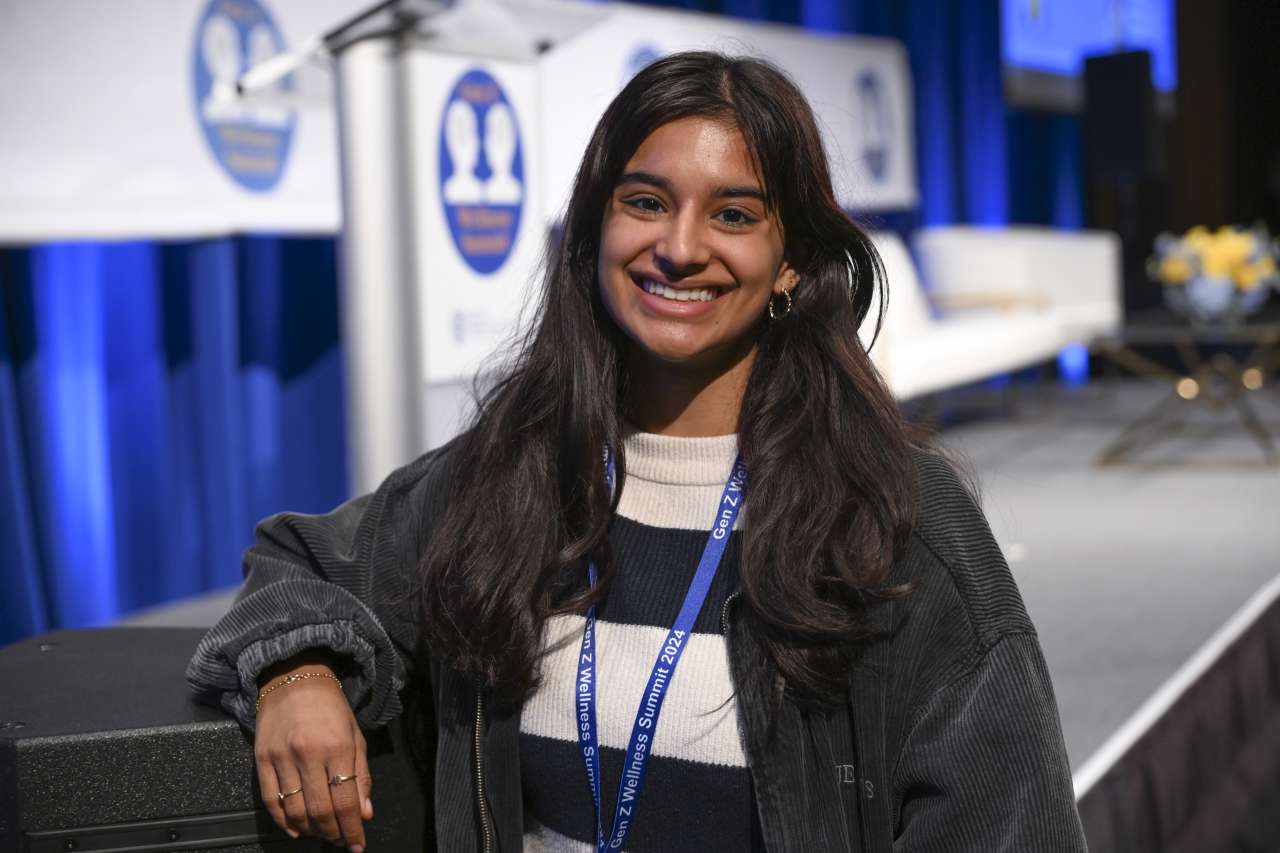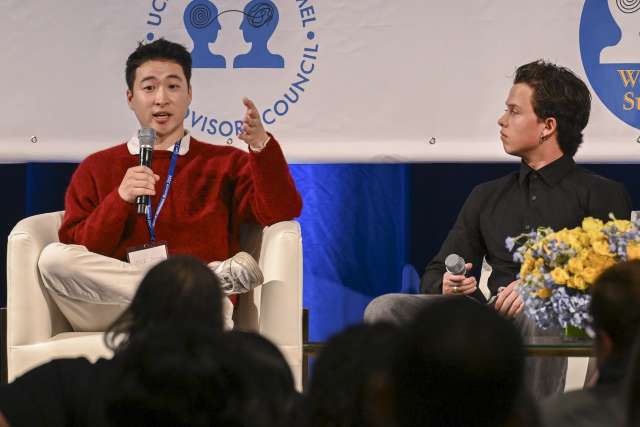The ubiquity of social media was a dominant theme of the inaugural Gen Z Wellness Summit.
The free mental health event for teens and young adults, held Feb. 25 on the UCLA campus, included a panel specifically focused on social media, but the significance of digital social networks came up again and again throughout the day, in conversations about body image, identity, relationships and anxiety.
Comedian Jena Friedman hosted the program, inviting guests to use a hashtag (#GenZWellnessSummit) when posting about the event online. “And then feel free to maybe get off of social media, because it’s probably 80% of the reason why you need this summit,” she joked.
Young people were already struggling with their mental health before the COVID-19 pandemic, which only made things worse. Members of Generation Z — people born between 1997 and 2012 — were more likely than older generations to describe their mental health as fair or poor, and that was back in 2018. U.S. Surgeon General Vivek Murthy, MD declared youth mental health a crisis in 2021, urging an “all-of-society effort” in response. According to a 2022 survey, 70% of Gen Zers in the U.S. report that their mental health needs urgent attention or improvement.
These statistics — and the lived experiences of young people who belong to the Friends of Semel Institute’s Teen Advisory Council — inspired the Gen Z wellness event. It was the brainchild of 18-year-old Zach Gottlieb, who, after attending the 2023 WOW Mental Health Summit at UCLA, thought, “We should have something like this for Gen Z.”
With the support of the Friends of the Semel Institute, its Teen Advisory Council and a grant from Selena Gomez’s Rare Impact Fund, the Gen Z Wellness Summit was born.
The daylong event, which drew around 600 attendees, featured Gen Z-centered conversations on such topics as addiction, eating disorders, social media, relationships and anxiety and depression, mediated by experts from the Jane and Terry Semel Institute for Neuroscience and Human Behavior. These presentations were punctuated with performances by young poets and singers, including Clinton Kane and SkyDxddy, and celebrity appearances from former L.A. Lakers star Metta Sandiford-Artest and “Riverdale” actress Lili Reinhart.
The power of personal stories
Tara Srinivasan, 21, a psychology student at UCLA, was drawn to the summit because of her interest in mental well-being. But she found herself unexpectedly inspired by the connective experience of hearing people’s personal stories about their mental health challenges.

“When you’re going through stuff, you’re going through it internally and alone. And when you’re in that space, it’s hard to see that everyone else might be going through it also,” she said. “But bringing everyone together in one space is like: everyone here cares about this topic and thinks it’s important. And hearing people share their stories, it’s like, OK, it’s not just me. There’s an entire room of people going through this.”
Destiny Gonzalez, a 17-year-old senior at Bell High School, was also moved by the personal experiences shared onstage. It makes mental health challenges feel more normal, she said.
“I feel like everybody has a story to tell and trauma to solve. Everybody has something they deal with,” she said. “That was really nice to see because we all kind of see our connection with one another.”
Seventeen-year-old Julian Farnsworth, a senior at the Buckley School in Sherman Oaks, had never attended an event like the Gen Z Wellness Summit. He came because a friend invited him and found the experience “very rewarding.”
“It’s a lot of touching stuff that they’re talking about, and I think it’s really important that we come out here and get to experience this,” he said.
Social media influence
The summit’s social media panel featured young influencers including Jacob Sartorius (who has 23.6 million followers on TikTok) and Eli Stone (1.1 million followers). Their advice for young people navigating social media and mental health? Consider algorithms a reflection of your state of mind. Social media algorithms determine what content shows up in your feed based on what you’ve engaged with in the past.
“The algorithm knows me better, so let me get to know myself,” Stone said.
It would be helpful if tech companies introduced fresh content that the algorithm might not normally predict, Sartorius said. If someone is looking at a lot of depressing content, or appears to be going down an unhealthy road, perhaps that could prompt unexpected content like a rock-climbing video, he suggested.
More transparency around how algorithms work, and even “legal limits on what the algorithm can and can’t do,” might also support a healthier relationship between young people and social media, Stone said.
The effects of social media also came up during a panel about eating disorders. Competition is a common theme for those with eating disorders, said panelist Katie Schmid, a model with more than 200,000 followers on Instagram. “Social media just heightens the competition and prevalence of comparison in this world,” she said.
It came up during the panel on anxiety and depression. “There are a lot of unrealistic expectations set through social media,” said Addison Carson, a junior at Harvard Westlake School. “I think it introduces a lot of everyday anxiety, especially for high school students, because we’re seeing this perfect lifestyle that really isn’t what it might look like, and that’s very anxiety-inducing.”
Added fellow panelist and Teen Advisory Council member Jonathan McGee: “We’re overstimulated every day by social media.”
It was also raised during a panel on justice, equity, diversity and inclusion, but in a positive light. Josh Chou, a UCLA graduate and coordinator for the UCLA PEERS Clinic, said that for some people, himself included, online spaces can provide real community and a safe place to be one’s authentic self.
“I’ve had that opportunity to go online and see other role models,” he said. “Because growing up, I didn’t have a lot of role models, in terms of queerness, that looked like me. And now that we have this platform, people are able to represent themselves.”



